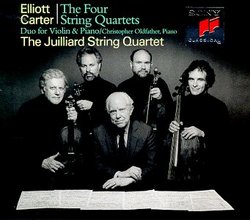| All Artists: Joel Krosnick, Joel Smirnoff, Christopher Oldfather, The Juilliard String Quartet Title: Elliott Carter: The Four String Quartets / Duo for Violin & Piano - The Juilliard String Quartet / Christopher Oldfather Members Wishing: 0 Total Copies: 0 Label: Sony Original Release Date: 1/1/1991 Re-Release Date: 9/26/1991 Genre: Classical Styles: Chamber Music, Historical Periods, Modern, 20th, & 21st Century, Instruments, Strings Number of Discs: 2 SwapaCD Credits: 2 UPC: 074644722925 |
Search - Joel Krosnick, Joel Smirnoff, Christopher Oldfather :: Elliott Carter: The Four String Quartets / Duo for Violin & Piano - The Juilliard String Quartet / Christopher Oldfather
 | Joel Krosnick, Joel Smirnoff, Christopher Oldfather Elliott Carter: The Four String Quartets / Duo for Violin & Piano - The Juilliard String Quartet / Christopher Oldfather Genre: Classical
These quartets are Juilliard specialties, and anyone wanting to hear this music played with a near ideal combination of virtuosity and humanity need look no further. Carter's quartets are not for the musically faint of hea... more » |
Larger Image |
CD DetailsSynopsis
Amazon.com essential recording These quartets are Juilliard specialties, and anyone wanting to hear this music played with a near ideal combination of virtuosity and humanity need look no further. Carter's quartets are not for the musically faint of heart: they are uncompromisingly thorny, intricate pieces that require lots of intense, dedicated listening. Very few people doubt their seriousness--or even their claims to musical greatness--but just as few people enjoy listening to them. Perhaps this spectacular set will encourage the adventurous to give them a shot. They're worth the time. --David Hurwitz Similar CDs
|
CD ReviewsNot the first choice due to a lackluster 1st Quartet Ian K. Hughes | San Mateo, CA | 08/13/2000 (3 out of 5 stars) "As far as I'm concerned, there is no one recording cycle that completely satisfies. However, I'd have to give the nod to the Arditti Quartet if for no other reason than this Julliard recording contains a vastly inferior interpretation of the 1st Quartet. Since that work is the key to getting inside of Elliott Carter's sound world ( I suppose one could argue for the Cello Sonata or Etudes for Woodwind Quartet ), it is crucial that a newcomer be introduced to a recording that does that particular piece justice. This is not the recording to do it. Coming from my experience with the Arditti and Composers Quartet versions, the 1993 Julliard is taken at too slow a tempo; the music seems bloated or bogged down and loses my attention. I'm not saying a newcomer couldn't possibly enjoy the performance; I just think the Arditti presents the music in a far better light. And I WOULD be surprised if those with prior experience with Carter prefer the 1994 Julliard interpretation of the 1st Quartet over the others previously recorded.The Julliard's 2nd and 3rd Quartets are much more to my liking. However, they are completely blown away by their prior ( LP ) recordings of the same works in 1974 ( world premiere for the 3rd ), which are electrifying! I hope SONY considers releasing those recordings on CD at some point in the future. RE the 4th; I've never warmed to this piece so I can't really say which ensemble takes pride of place. The Julliard haven't included the 5th Quartet ( 1995 ) since these sessions took place prior to Carter's completion of that work. The Arditti HAVE recorded it (Montaigne), making theirs the only complete cycle of Carter quartets available. Their 2nd & 3rd, although differing quite a bit in approach, don't seem MORE convincing than the 1993 Julliard ( the 1974 Julliard is, as I've implied, a world apart ). Elliott Carter, for me, has composed the finest string quartet cycle since Bartok ( Brian Ferneyhough may be the next link in the "quartet chain" ). I urge people with a love for adventurous, well structured and moving music to check ALL of his work out. Currently 91 years old, he's certainly one of the most consistent composers in terms of the sheer quality of invention displayed piece after piece for the last half century. Nearly every one of his works since 1950 is either of ground-breaking importance ( Quartets, Double Concerto, Night Fantasies, Symphonia ) or at least of great interest ( Variations for Orch, A Mirror on Which to Dwell, Brass Quintet, numerous solo pieces ). I'd recommend starting with the Piano or Cello Sonatas ( mid/late 1940's ) if you still don't feel comfortable with composers working in a "serial" or quasi-serial vein but like Bartok and Stravinsky ( c. 1910-1930 )." Benchmark recording Adam Greene | San Diego, CA | 05/28/2000 (5 out of 5 stars) "Thus recording of Carter's first four quartets presents the music with warmth, clarity, and electricity. In 1991 I attended the release concert at Alice Tully Hall in New York, where the Julliards played all four quartets. It is a prodigious feat for any ensemble to play nearly two hours of dense, intricate, and technically challenging music such as this, but the intensity of their engagement never wavered, and the depth of their understanding was always evident. These characteristics are equally present in these recordings. Even the notorious Third Quartet, whose conflicting time streams makes coordination between players a transcendent business, manages to project a mercurial drammaturgy in Julliard's hands. This is a rare example of a technically virtuostic ensemble who, nevertheless, are devoted to projecting Carter's expressive language. These recordings are vastly superior to those by the Arditti Quartet, which sound stale by comparison. A notable distinction between the Julliard's rendition of the Third Quartet and those of the Composers Quartet and the aforementioned Arditti is that Julliard is the only group which did not employ a prerecorded click track to guide their performance. The others, either as a circumstance of time constraints in the recording process or sheer technical difficulty needed such a "crutch." Robert Mann, the founding member of the Julliard Quartet and firt violinist, was well into his seventies when these recordings were made. His technical skills had not diminished - rhythm, intonation, and bowing are all first rate. More importantly the depth of experience and his long association with Carter were effectively transmitted to the other performers, and are manifested throughout the recording. While the performance of the Duo for violin and piano is excessively harsh and monotone (one should seek out Irvine Arditti and Ursula Oppens' far superior release on Montaigne from 1999), the Quartets ring with clarity and warmth; an unusual but welcome achievement for music that is often presented as abrasive and undifferentiated." A muscular interpretation, a brilliant recording! R. Hutchinson | a world ruled by fossil fuels and fossil minds | 08/22/2001 (5 out of 5 stars) "The Juilliard Quartet, with the supervision of Carter himself, recorded this version of the Four Quartets in 1991, only a few years after the Arditti Quartet had recorded them for Etcetera after touring with Carter. What a contrast! The JQ performs these modernist masterpieces with a muscular, machine-like relentlessness, highlighting the structure. Their interpretation is masculine, in the traditional meaning of the word, while the AQ's interpretation is more lyrical and fluid, with broader vibrato, emphasizing feeling -- in a word, more traditionally feminine. If I had to choose one, I would take the Arditti performance, (and I agree that the JQ's tempo on the First is too slow) but they are both stellar. However, there are other considerations. The recording quality of the Juilliard Quartet on Sony is magnificent, while the AQ on Etcetera is much less crisp and clear. And the JQ/Sony package is all you could ask for, with a 28-page booklet extensively explaining the works, even diagramming the notoriously complex Third Quartet. I would hate to have to choose -- I heartily recommend both versions. But the JQ version, all things considered, has the best claim to being the "standard." You must hear it!"
|

 Track Listings (14) - Disc #1
Track Listings (14) - Disc #1


